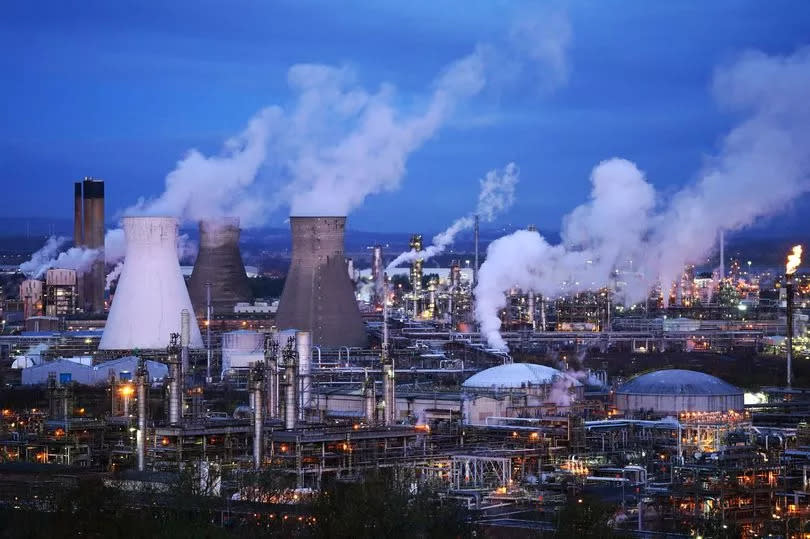Banned Russian oil could make its way into Scotland if Grangemouth plans go ahead
Russian oil could flood into Scotland if the Grangemouth refinery closes, it has been claimed.
A sanctions loophole means diesel and jet fuel which is funding Putin’s war machine can often enter the UK legally if processed in a third country.
The Sunday Mail can reveal PetroChina – the Chinese government firm which part owns Grangemouth along with billionaire Jim Ratcliffe’s Ineos – began trading Russian crude last year.
And campaigners fear if Petroineos is allowed to carry out its plan of shutting down the Grangemouth refinery and turning the site into an import depot only, ii will open the door to Russian oil.

Isaac Levi, of the Centre for Research on Energy and Clean Air (CREA), said: “Due to a gaping legal loophole in the sanctions, the UK is importing refined oil made from Russian crude in non-sanctioning countries.
“In one year the UK’s purchases of this oil sent over £140million in tax revenues fueling the Kremlin war chest, equivalent to almost a third of the UK’s
humanitarian aid provided to Ukraine. If UK policy makers and businesses are arguing that they need to keep buying this oil produced from Russian crude it is not only incorrect but therefore seems a strange decision to allow Scotland’s only crude oil refinery to close.”
Petroineos bosses announced last year a plan to close the oil refinery at Grangemouth with the loss of hundreds of jobs and turn
the site into an import terminal only.
Large quantities of oil products are already imported through the port with millions of pounds worth of goods coming from China.
A Petroineos spokesman said: “We are fully compliant with all relevant sanctions.”
However, the firm declined to clarify whether any Russian crude refined in third countries had been imported already in compliance with sanctions rules.
A spokesperson for Forth Ports, owner of the Port of Grangemouth, said: “It is the responsibility of the importer to satisfy themselves as to the provenance of goods being imported and that these meet all relevant regulations.”
Earlier this year a CREA report found millions of barrels of fuel made from Russian oil are still being imported to the UK as a result of the loophole.
This is not illegal and does not breach the UK’s Russian oil ban despite critics believing it undermines sanctions aimed at restricting Russia’s war funds.
The UK government has confirmed that internationally recognised “rules of origin” define that crude, once refined in another country, is classed for the purposes of trade as originating from the refining country.
The UK is among many Western countries to ban the import of all oil and oil products that originate in Russia in a bid to hit the amount of cash Moscow can generate from fossil fuels.
CREA said this “refining loophole” meant countries such as India and China, who have not sanctioned the Kremlin, are able to legally import Russian crude and refine it into oil products such as jet fuel and diesel.
It emerged last year PetroChina had resumed buying discounted Russian crude after a brief pause in late 2022, just before the European Union embargo on Russian oil started.
Russian crude, typically consumed in Europe, is now heading to India and China at depressed prices following an EU ban on Russian crude because of the Ukraine war.
The state refiners have received permission from their headquarters to buy Russian crude from trading companies at large discounts.
Petroineos announced last year a plan to close the oil refinery at Grangemouth with the loss of hundreds of jobs and turn the site into an import terminal only.
Large quantities of oil products are already imported through the port with millions of pounds worth of goods coming from China.
A Petroineos spokesman said: “We do not process Russian Crude oil, nor trade any Russian refined products. We are fully compliant with all relevant sanctions.”
The firm declined to clarify whether any Russian crude refined in third countries had been imported already in compliance with sanctions rules.
A spokesperson for Forth Ports, owner of the Port of Grangemouth, said: “The Port of Grangemouth handles the import and export of millions of tonnes of cargo each year.
“It is the responsibility of the importer to satisfy themselves as to the provenance of goods being imported and that these meet all relevant regulations.
“Forth Ports, in its role as statutory harbour authority, complies with all DfT regulations on sanctioned or proscribed vessels in all its jurisdictions.”
Don't miss the latest news from around Scotland and beyond. Sign up to our daily newsletter.

 Yahoo News
Yahoo News 
